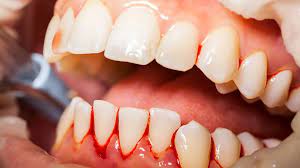Gum bleeding Treatment - Abu Dhabi - Dubai
Gum bleeding can be caused by several factors, including poor oral hygiene, gum disease, hormonal changes, certain medications, and systemic conditions such as diabetes. If you're experiencing gum bleeding, it's important to address the underlying cause and seek treatment. Here are some steps you can take:
- 1. Improve your oral hygiene: Proper oral hygiene is crucial for preventing and treating gum bleeding. Make sure to brush your teeth twice a day with a soft-bristled toothbrush and fluoride toothpaste. Use gentle, circular motions and pay attention to the gum line. Don't forget to floss daily to remove plaque and debris from between your teeth.
- 2. Rinse with saltwater: Saltwater rinses can help reduce inflammation and promote healing. Mix half a teaspoon of salt in a glass of warm water and swish it around in your mouth for about 30 seconds, then spit it out. Repeat this a few times a day.
- 3. Use a mouthwash: Antiseptic mouthwashes can help kill bacteria and reduce gum inflammation. Look for a mouthwash containing ingredients like chlorhexidine or hydrogen peroxide. Follow the instructions on the bottle for proper use.
- 4. Maintain a healthy diet: A nutritious diet can support gum health. Include foods rich in vitamins C and K, such as citrus fruits, leafy greens, and berries. These vitamins help strengthen blood vessels and promote gum healing.
- 5. Avoid tobacco products: Smoking and using other tobacco products can worsen gum bleeding and delay healing. If you're a smoker, consider quitting or seeking professional help to quit.
- 6. Visit a dentist: If your gum bleeding persists or worsens, it's important to see a dentist for a thorough evaluation and appropriate treatment. They can diagnose the underlying cause of your gum bleeding and recommend specific treatments.
Depending on the severity of your gum bleeding and the underlying cause, your dentist may suggest one or more of the following treatments:
- • Professional dental cleaning: This involves the removal of plaque and tartar from your teeth and gums. It helps eliminate bacteria and reduces inflammation.
- • Scaling and root planing: If you have gum disease, your dentist may recommend scaling and root planing. This is a deep cleaning procedure that removes plaque and tartar from beneath the gum line and smooths the tooth roots to prevent bacteria buildup.
- • Gum surgery: In advanced cases of gum disease or if other treatments haven't been successful, surgical intervention may be necessary to remove infected tissue or reshape the gums.
Remember, it's essential to consult with a dental professional for an accurate diagnosis and appropriate treatment plan based on your specific situation. They can provide personalized guidance and help you maintain optimal gum health.

